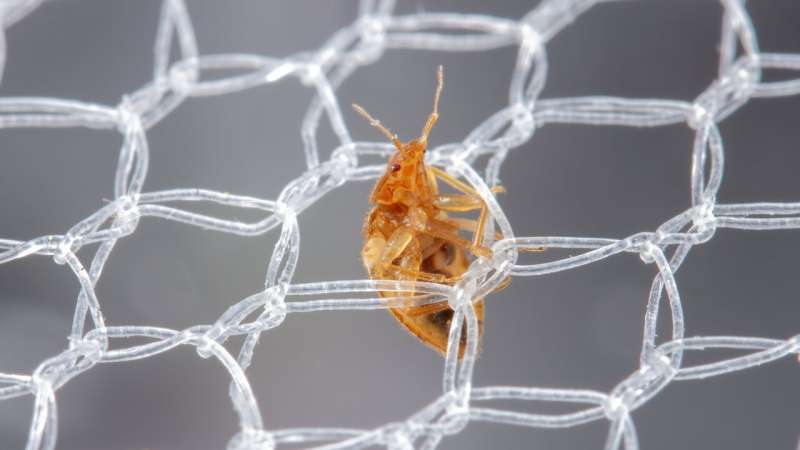This article has been reviewed according to Science X's editorial process and policies. Editors have highlighted the following attributes while ensuring the content's credibility:
fact-checked
peer-reviewed publication
trusted source
proofread
The unintended consequences of success against malaria

For decades, insecticide-treated bed nets and indoor insecticide spraying regimens have been important—and widely successful—treatments against mosquitoes that transmit malaria, a dangerous global disease. Yet for a time, these treatments also suppressed undesirable household insects like bed bugs, cockroaches and flies.
Now, a new North Carolina State University study reviewing the academic literature on indoor pest control shows that as the household insects developed resistance to the insecticides targeting mosquitoes, the return of these bed bugs, cockroaches and flies into homes has led to community distrust and often abandonment of these treatments—and to rising rates of malaria.
The work appears in Proceedings of the Royal Society B: Biological Sciences.
In short, the bed nets and insecticide treatments that were so effective in preventing mosquito bites—and therefore malaria—are increasingly viewed as the causes of household pest resurgence.
"These insecticide-treated bed nets were not intended to kill household pests like bed bugs, but they were really good at it," said Chris Hayes, an NC State Ph.D. student and co-corresponding author of a paper describing the work. "It's what people really liked, but the insecticides are not working as effectively on household pests anymore."
"Non-target effects are usually harmful, but in this case they were beneficial," said Coby Schal, Blanton J. Whitmire Distinguished Professor of Entomology at NC State and co-corresponding author of the paper.
"The value to people wasn't necessarily in reducing malaria, but was in killing other pests," Hayes added. "There's probably a link between use of these nets and widespread insecticide resistance in these house pests, at least in Africa."
The researchers add that other factors—famine, war, the rural/city divide, and population displacement, for example—also could contribute to rising rates of malaria.
To produce the review, Hayes combed through the academic literature to find research on indoor pests like bed bugs, cockroaches and fleas, as well as papers on malaria, bed nets, pesticides and indoor pest control. The search yielded more than 1,200 papers, which—after an exhaustive review process—were whittled down to a final count of 28 peer-reviewed papers fulfilling the necessary criteria.
One paper—a 2022 survey of 1,000 households in Botswana—found that while 58% were most concerned with mosquitoes in homes, more than 40% were most concerned with cockroaches and flies.
Hayes said a recent paper—published after this NC State review was concluded—showed that people blamed the presence of bed bugs on bed nets.
"There is some evidence that people stop using bed nets when they don't control pests," Hayes said.
The researchers say that all hope is not lost, though.
"There are, ideally, two routes," Schal said. "One would be a two-pronged approach with both mosquito treatment and a separate urban pest management treatment that targets pests. The other would be the discovery of new malaria-control tools that also target these household pests at the same time. For example, the bottom portion of a bed net could be a different chemistry that targets cockroaches and bed bugs.
"If you offer something in bed nets that suppresses pests, you might reduce the vilification of bed nets."
More information: Review on the impacts of indoor vector control on domiciliary pests: good intentions challenged by harsh realities, Proceedings of the Royal Society B: Biological Sciences (2024). DOI: 10.1098/rspb.2024.0609. royalsocietypublishing.org/doi … .1098/rspb.2024.0609
Journal information: Proceedings of the Royal Society B
Provided by North Carolina State University


















